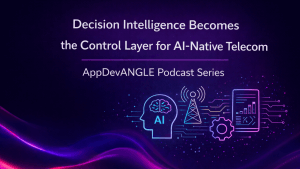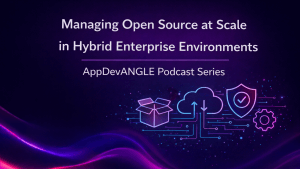ABSTRACT: Enterprise data platforms are evolving to support AI, data products, governance, and metadata across distributed environments. As AI and agentic applications grow, organizations need data platforms that unify metadata, enable secure governance, and deliver trusted data products at scale. We dive into how a vision is required that connects AI, governance, metadata, and data products into a cohesive platform strategy for modern enterprise data architectures with Justin Borgman, CEO of Starburst.
In discussions with enterprises we see as AI adoption accelerates, organizations are facing an urgent organizational imperative: domocratize access and activate data assets across silos without compromising governance, performance, or compliance. In a recent AnalystANGLE, the whole conversation below, Justin Borgman, CEO of Starburst, articulated a clear vision for how modern data platforms, built on open standards and centered on data products, can serve as the foundation for agentic applications and AI-driven business transformation.
The Foundation for Scalable AI Data Architectures
Borgman underscored the critical role of Apache Iceberg as the emerging standard for table formats in data lakehouse architectures. Over the past year, Iceberg has become widely adopted across vendors, enabling data interoperability and minimizing vendor lock-in, key concerns for enterprise buyers. As AI workloads demand faster, broader access to large datasets, Iceberg provides an open, high-performance format that enables data consolidation without replication. Starburst views this standard not only as a technical foundation but as a strategic enabler of agility and cost optimization in the age of enterprise AI.
The Core Abstraction for Agentic Workloads
Data products are rapidly becoming essential building blocks in the enterprise AI stack. In a discussion, we defined data products as curated, governed data assets enriched with business context and metadata, designed for application, agent, and developer consumption. In Starburst’s federated architecture, data products can span distributed sources, creating virtual views that unify access without centralization. This abstraction simplifies access for AI agents and reduces friction in enterprise data usage, particularly as agentic systems demand more autonomy and precision. We agreed that data products act as an API surface for AI systems, enabling human and agent-to-agent interactions with clean, trusted data. Where this layer sits in the entire stack is up for debate, but curated data will be required.
Getting to Autonomous and Compliant Agentic AI
As AI agents become more autonomous and potentially begin communicating agent-to-agent, the need for rich metadata, semantic context, and governance becomes paramount. It was highlighted that catalogs now play a dual role: they enable data discovery and provide the semantic layer necessary for AI systems to reason over data. In the Starburst world, they also leverage usage metadata, such as query patterns, to infer relationships between datasets, further enriching the system’s understanding. This way, data products and catalogs combine to support governance-by-design, enabling transparency and explainability, especially in regulated industries.
Flattening Data Silos: A Prerequisite for AI Success
The main problem that all organizations face is that enterprise data remains trapped in fragmented silos, both by architecture and compliance constraints. Rather than replicating this data into centralized warehouses, it will be essential to query data in place across hybrid, multi-cloud, and on-prem environments. This approach allows organizations to avoid brittle pipelines and massive data movement, especially at the petabyte scale. We see the ability to support distributed queries and data caching across environments aligns directly with customer priorities: enabling AI workflows without sacrificing performance, governance, or locality. Customers can choose to assemble data products virtually, enabling faster AI deployment and iteration with minimal architectural disruption.
Citi’s Strategic Investment in the Starburst Vision
Starburst’s architectural philosophy recently received high-profile validation from Citi, which expanded its deployment of Starburst and became a strategic investor. Borgman detailed how Citi’s global footprint, operating in 170 countries with diverse compliance regimes, tested Starburst’s ability to support distributed, governed data access at scale. Citi’s investment marks more than a financial milestone; it reflects confidence in Starburst’s platform as a foundation for its enterprise-wide AI transformation. According to Borgman, large organizations increasingly see AI as a dual driver of cost efficiency and revenue growth. They invest in platforms unifying access across business lines without adding data risk.
Our ANGLE
We believe that Starburst and other companies like Starburst are positioning themselves not just as a query engine or lakehouse enabler, but as the data platform control plane for enterprise data in the age of agentic AI. By aligning open standards like Iceberg with distributed data products and reinforcing those with semantic governance, we see that distributed data can be more efficiently leveraged and helps enterprises build AI-ready data architectures without massive replatforming. As AI agents evolve into first-class consumers and producers of enterprise intelligence, platforms like Starburst that enable secure, contextualized, and federated data access will be critical to competitive advantage.
We also see that data platforms will continue to be built from multiple different tools from some of the vendors you might have in your kit today, and some new vendors, like Starburst and others. This continues to be proven out as larger storage platform vendors bring more of this tech to their kits, either natively, through partnerships, such as the Dell DataLake powered by Starburst, and an all of the above strategy. What is clear is that there will not be a single data platform from one vendor to rule than all. There are just too many use cases and data silos.
Feel free to reach out and stay connected through robs@siliconangle.com, read @realstrech on x.com, and comment on our LinkedIn posts.



